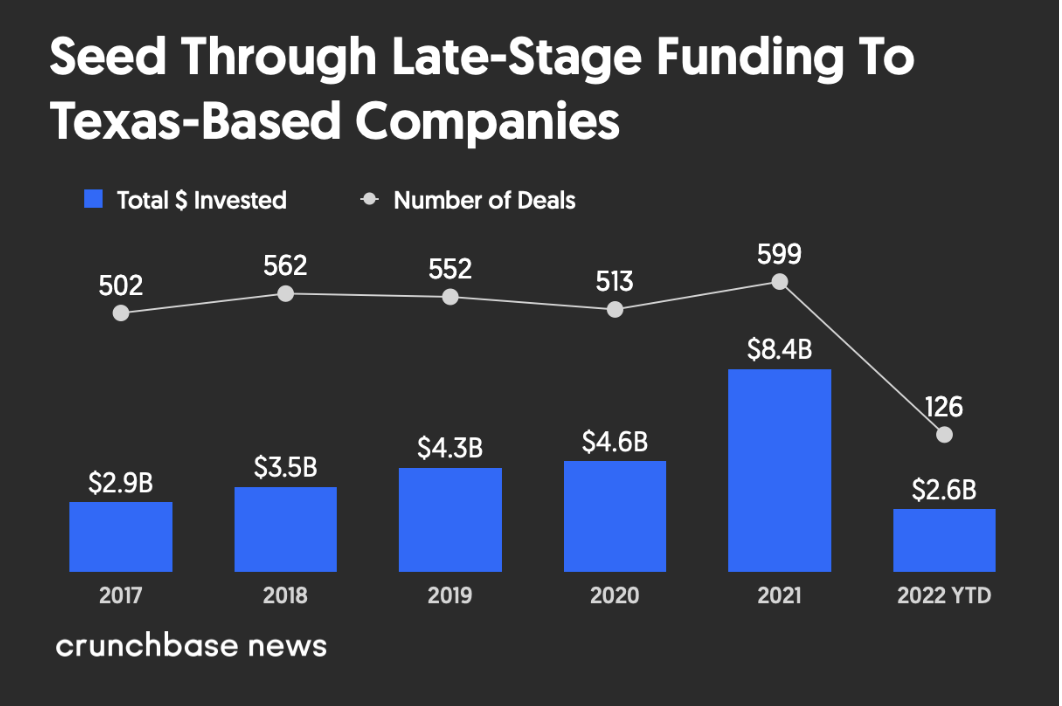Texas is no slacker on the startup funding front, largely due to Austin’s rising status as a tech hub. But even so, the nation’s second most populous state has generally punched a bit below its weight class when it comes to venture investment.
Recently, however, things have been picking up. So far this year, Texas companies have pulled in over $2.6 billion in seed through growth-stage venture funding, per Crunchbase data. That puts the state on track to well surpass its 2021 funding totals—which were themselves the highest on record.
For perspective, we chart out total funding and round counts for the past five-plus years below:

What’s driving the gains?
What’s driving the gains? Well, first off, North American venture investment overall rose dramatically in 2021. A record $329.5 billion went into startup investments across all stages, up 92 percent from 2020 levels.
So, to put things into context: Texas did well last year, but so did almost every tech hub. Overall, funding to Lone Star State companies rose 83 percent from 2020 to 2021, a tad below the North American average.
Search less. Close more.
Grow your revenue with all-in-one prospecting solutions powered by the leader in private-company data.
In 2022, meanwhile, Texas appears to be outperforming the average. Much of that is driven by a handful of giant-sized rounds, mostly for Austin-based companies. While it’s too early to predict how the year will pan out, local venture investors say it’s a likely indicator of more to come.
“As a California transplant, I think the Texas region is going to be an amazing ecosystem,” said Mike Smerklo, co-founder and managing director at Austin-based startup investor Next Coast Ventures. The firm, which just closed on $310 million in new funds, makes a large portion of its investments in its home city.
At S3 Ventures, a VC focused on Texas startups, Managing Director Brian R. Smith recently said: “We believe that by 2030, Texas could be the second-largest technology ecosystem in the country.” The Austin-based firm announced a $250 million fund VII earlier this month, bringing assets under management to $900 million.
Austin is by far the top spot in Texas for startup investment, with roughly 58 percent of funding so far this year going to companies headquartered in the city alone. The largest 2022 funding recipients based there include e-commerce software provider Cart.com, 3D-printed home developer ICON, and telehealth company Wheel.
Beyond Austin, the more populous Houston and Dallas metro areas are also drawing a sizable share of startup capital. Out of Dallas, big 2022 funding recipients include distributed generation platform Aspen Power and cybersecurity provider Island. From the Houston area, we see ENCINA, a developer of products made from plastic waste, and Zeta Energy, a rechargeable battery company.
Maybe cheaper, but no longer cheap
The growing startup clout of Texas, and Austin in particular, comes as the cost of living and doing business in the state is on the rise.
This isn’t a new observation. But it’s noteworthy in that Austin has long held appeal as a cheaper alternative to coastal tech hubs.
During my time in the Bay Area, for instance, it often seemed like you couldn’t stand in line behind someone ordering an oat milk fair trade latte without overhearing someone else discussing the pros and cons of relocating to Austin. Invariably, snippets of these conversations touched upon: 1. Comparative housing costs (lower in Austin); 2. Comparative salaries (lower in Austin); and 3. Comparative weather (hotter in Austin); plus some reminiscing around time spent at South by Southwest.
Apparently, many of the more tech-minded among those latte drinkers did in fact make the move to Austin. Today, the city is bursting with talented techies launching startups and pursuing careers at an ever-growing array of venture-backed companies and established “Big Tech” employers.
That has brought challenges as well, including ever-rising cost of living paired with heightened competition for talent. Many local startups are having to boost salaries significantly to recruit and retain top people, Smerklo said.
On the other hand, protracted boom times have created a much more opportunity-rich place to pursue a career. Ten years ago, Smerklo recalls, relocating to Austin for a job, particularly at a startup, was a risky move. If it didn’t work out, there were limited local replacement options. That’s no longer the case.
“That risk has been completely eliminated,” Smerklo said.
Illustration: Li-Anne Dias

Stay up to date with recent funding rounds, acquisitions, and more with the Crunchbase Daily.












67.1K Followers